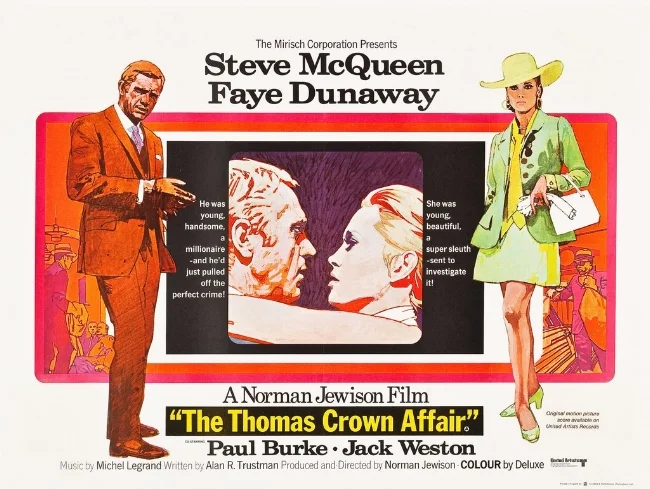The Thomas Crown Affair (1968)
Millionaire businessman Thomas Crown (Steve McQueen) arranges for four men to steal $2,660,527.62 from a Boston bank. The men, who have never met before or seen Crown, successfully carry out the robbery. A fifth man then transports the stolen money and dumps it in a cemetery trash can. Crown retrieves the money, flies to Geneva and deposits it in a Swiss bank account. Eddy Malone (Paul Burke), the Boston police detective in charge of the case makes no progress until the bank’s insurance company assigns him one of their top investigators, Vicki Anderson (Faye Dunaway). Anderson thinks like a thief and works based upon her instincts. Looking through the evidence, she deduces that Crown is the culprit, potentially committing crimes just for amusement. Anderson subsequently meets Crown socially. Despite the situation and their respective positions, they are immediately attracted to each other and begin a relationship.
The Thomas Crown Affair is neo noir and a microcosm of Hollywood progressive cinema from the late sixties. It has a French cinematic aesthetic in its lighting and framing. Haskell Wexler’s cinematography is very fluid. The film makes extensive use of split screen and "multi-dynamic image technique", images shifting on moving panes. Director Norman Jewison directs confidently and with style focusing often on what is not being said, rather than what is. McQueen and Dunaway are charismatic and beautiful. They exude sex appeal and the pair carry what is essentially a dialogue light love story, through their onscreen presence. Noel Harrison’s performance of the song, The Windmills of Your mind, is suitably haunting and alludes to the complexities of Thomas Crown’s personality. It is all very arty, drawing upon all the prevailing cinematic trends and tropes of the time.
All of which is why I found The Thomas Crown Affair to be an interesting example of filmmaking from the sixties, rather than being an interesting film per se. Pop culture has evolved and the concept of the millionaire playboy and their “jet set” lifestyles is no longer universally admired and desired. Millionaires are now more often and not seen as Bond villains or at the very least, socially and emotionally dysfunctional. Hence the premise of The Thomas Crown Affair is dated with its self indulgent playboy master criminal. The more interesting aspect of the screenplay by Alan Trustman is the exploration of the “burden of wealth” and how having everything means you have nothing. Sadly, this is not explored sufficiently, as is the subplot about Crown’s dead wife. The bittersweet ending does work well and still rings very true. But the journey to this point is far too enamoured with presentation rather than feelings.
Perhaps the most problematic aspect of The Thomas Crown Affair is the soundtrack by French composer Michael Legrand. Norman Jewison originally wanted Henry Mancini to write the score for the film but he was unavailable and so recommended Legrand. His jazz heavy music was intentionally written for the rough cut of the film. Hence it had to be edited to fit on screen events in the final cut, which further makes the music an incongruous match. Plus jazz is a very broad church, musically speaking. Lalo Schifrin’s score for Bullitt, released the same year as The Thomas Crown Affair, is still cool as hell and funky. Legrands’ approach is far less melodic and far more kinetic. It is often very intrusive and frankly distracting. It ultimately makes a problematic film, even harder to watch for a modern audience. I may give the 1999 remake a watch to see if it handles the subject any better.










